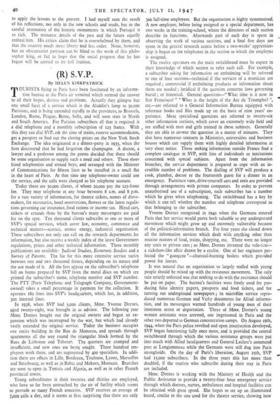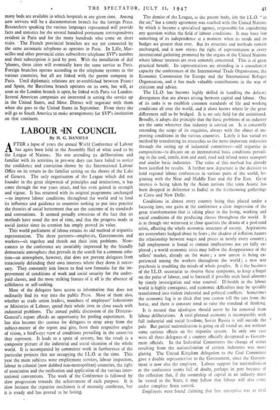(R) S.V.P.
By HELEN KIRKI"ATRICK•
TOURISTS flying to Paris have been fascinated by an informa- tion bureau at the Paris air terminal which seemed the answer to all their hopes, desires and problems. Actually they glimpse but one small facet of a service which is the Aladdin's lamp to 30,000 Parisians, and is being extended rapidly to the provinces, to Brussels, London, Rome, Prague, Berne, Sofia, and will soon start in North and South America. For Parisian subscribers all that is required is a dial telephone and a monthly subscription of 125 francs. With • this they can dial SVP, ask the time of trains, reserve accommodation, get a passport or find out the closing prices on the New York Stock Exchange. The idea originated at a dinner-party in 1935, when the host discovered that he had forgotten the champagne. .A doctor, a lawyer and a professor among the guests decided that there should be some organisation to supply such a need and others. These three hired telephonists and errand boys, and arranged with the Minister of Communications for fifteen lines to be installed in a small flat in the heart of Paris. At that time any telephone-owner could use the service, and the calls were charged to his telephone account.
Today there are 30,000 clients, of whom 20,000 pay the 125-franc
fee. They may telephone at any hour between 8 a.m. and 8 p.m. for a vast variety of information, for theatre tickets, names of dress- makers, for secretaries, hotel reservations, flowers or the latest regula- tions governing car insurance, food rations or income tax. Hired cars, tickets or errands done by the bureau's many messengers are paid for on the spot. Ten thousand clients subscribe to one or more of SVP's special services, which cover law, economy, commerce and technical matters—science, atomic energy, industrial organisation. These subscribers not only can call on the research departments for information, but also receive a weekly index of the latest Government regulations, prices and other technical information. Three monthly publications are available : 7udicial Studies, Economic Studies and a Survey of Patents. The fee for this more extensive service varies between one and two thousand francs, depending on its nature and the use made of it. All the fees appear on the subscriber's telephone bill on forms prepared by SVP from the metal discs on which are printed the subscriber's name, telephone number and SVP number. The PTT (Paris Telephone and Telegraph Company, Government- owned) takes a small percentage in payment for the collection. It operates 18o lines into SVP's headquarters, which has, in addition, 300 internal lines.
In 1938, when SVP had 5,000 clients, Mme. Yvonne Domes, aged twenty-eight, was brought in as adviser. The following year Mme. Domes bought out the original owners and began an ex- pansion which was interrupted by the war, but which had already vastly extended the original service. Today the business occupies one entire building in the Rue de Monceau, and spreads through apartments all the way round the triangular block formed by the Rues de Lisbonne and Teheran. The quarters are cramped and insufficient, and new ones are being sought. Three hundred em- ployees work there, and are augmented by 400 specialists. In addi- tion there are offices in Lille, Bordeaux, Toulouse, Lyons, Marseilles and Strasbourg, as well as in Rabat and Meknes, Morocco. Branches are soon to open in Tunisia and Algeria, as well as in other French provincial towns.
Young subordinates in their twenties and thirties are employed, who have so far been untouched by the air of futility which seems to pervade so many French concerns. SVP receives an average of 7,000 calls a day, and it seems at first surprising that there are only 300 full-time employees. But the organisation is highly systematised. A new employee, before being assigned to a special department, has two weeks in the training-school, where the directors of each section describe its functions. Afterwards part of each day is spent in observing the work of various sections, and a final five days are spent in the general research centre before a two-weeks' apprentice- ship is begun on the telephones in the section to which the employee is assigned.
The twelve operators on the main switchboard must be expert in their knowledge of which section to refer each call. For 'example, a subscriber asking for information on embalming will be referred to one of four sections—technical if the services of a mortician are required ; commercial if embalming products or information about them are needed ; juridical if the question concerns laws governing burial ; or historical. General questions—" What time is it now in San Francisco? " " What is the height of the Arc de Triomphe? ", etc.—are referred to a General Information Bureau equipped with reference books and files made up on the basis of nine years' ex- perience. Moir specialised questions are referred to twenty-six other information sections, which cover an extremely wide field and are staffed with men and girls trained in these subjects. Generally they are able to answer the question in a matter of minutes. They also have numerous contacts in Ministries, universities and business houses which can supply them with highly detailed information at very short notice. Those seeking information outside France find a complete catalogue in SVP, with lists of individuals or institutions concerned with special subjects. Apart from the .information branches, the service department is prepared to cope with an in- credible number of problems. The dialling of SVP will produce a cook, plumber, doctor or the fourteenth guest for a dinner in an emergency. Furniture vans, drive-yourself cars and taxis are provided through arrangements with private companies. In order to prevent unauthorised use of a subscription, each subscriber has a number which he gives when telephoning. The switchboard has a key by which it can tell whether the number and telephone correspond to that belonging to the subscriber.
Yvonne Domes recognised in 1940 when the Germans entered Paris that her service would prove both valuable to any underground movement which might grow up and extremely vulnerable because of the political-inforniation branch. For four years she closed down all the information services which dealt with anything other than routine matters of food, trains, shopping, etc. There were no longer any taxis or private cars ; so Mme. Domes invented the velo-taxi- a rickshaw-like affair drawn by a cyclist. One of her engineers per- fected the " gazogene "—charcoal-burning boilers which provided power for lorries.
It was natural that an organisation So largely staffed with young people should be mixed up with the resistance movement. The only rule strictly enforced was that nothing to do with the resistance should be put on paper. The bureau's facilities were freely used for pro- ducing false identity papers, passports and food tickets, and for turning out underground newspapers ; its microfilm service repro- duced numerous German and Vichy documents for Allied informa- tion, and its messengers warned hundreds of young men of their imminent arrest or deportation. Three of Mme. Dornes's young women assistants were arrested, one imprisoned in Paris and the other two deported to German concentration camps. On August 19th, 1944, when the Paris police revolted and open insurrection developed, SVP began functioning fully once more, and it provided the central switchboard through which the various resistance groups were put into touch with Allied headquarters and General Leclerc's command post at Longjammeau while the Germans were still dug into Paris strongholds. On the day of Paris's liberation, August 25th, SVP had 15,000 subscribers. In the three years this has more than doubled, if the tourists who subscribe during their stay in Paris are included.
Mme. Domes is working with the Ministry of Health and the Public Assistance to provide a twenty-four hour emergency service through which eloctors, nurses, ambulances and hospital facilities can be obtained with great speed. She hopes to set up an illuminated board, similar to the one used for the theatre service, showing how
many beds are available in which hospitals at any given time. Among new services will be a documentation branch for the foreign Press. Researchers speaking the various languages represented will provide facts and statistics for the several hundred permanent correspondents resident in Paris and for the many .hundreds who come on short visits. • The French provincial branches are not yet connected by the same automatic telephone as operates in Paris. In Lille, Mar- seilles and other provincial cities subscribers telephone SVP's number and their subscription is paid by post. With the installation of dial 'phones, these cities will eventually have the same service as Paris. Foreign branches operate according to the telephone systems in the various countries, but all are linked with the parent company in Paris. Until diplomatic relations are re-established between France and Spain, the Barcelona branch operates on its own, but will, as soon as the London branch is open, be linked with Paris via London. Several American companies are interested in setting the service up in the United States, and Mme. Domes will negotiate with them when she goes to the United States in September. From there she will go to South America to make arrangements for SVP's institution on that continent.



































 Previous page
Previous page